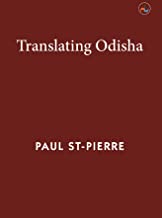What can a study of translations tell us about the unfolding of societal and cultural patterns and trends? If translation is taken to be a source and agent of ‘change’ in a society, how can a translational approach to history help us gain insights into a community’s past and its potential for self-determination? Moreover, how can the study of translations, carried out in a specific language community over a period of time, reveal wider consequences for the culture as a whole? Of course, these questions are not new to translation studies, but a fresh articulation of these in local and regional contexts has assumed urgency in postcolonial societies like India. The book under review tells the story of Odisha in and through translation. It is a two-fold story of Odisha translated and Odisha engaging in translation.
Translating Odisha is a compendium of writings on the translation scene in Odisha, put together by Paul St-Pierre over the past two decades. These include scholarly essays, case studies, introductions to texts he has translated or edited, reviews of Odia works translated into English, and short personal reflections.

